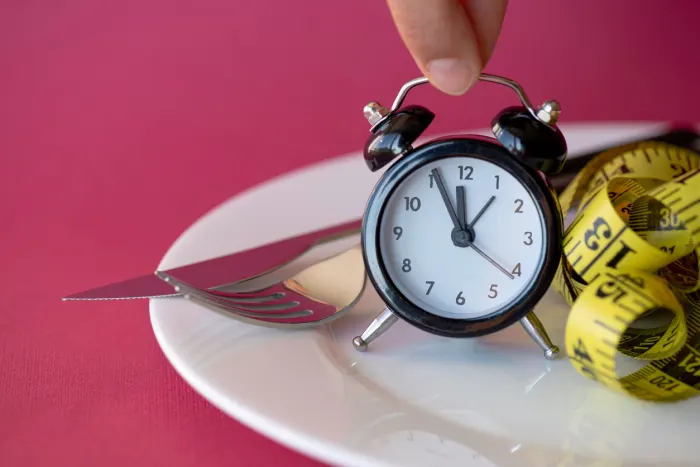Research Says This is the Best Way to Time Your Eating for Ultimate Weight Loss

The timing of your meals could matter more than you think.
When it involves Ultimate Weight Loss, several folks rely on what to eat instead of once to eat. however will the temporal order of your meals matter? New analysis suggests that it does, in fact, create a difference.
within the study, researchers examined ninety folks with blubber to check whether or not active time-restricted feeding early in the day is simpler for weight loss, fat loss and cardiometabolic health compared to eating over a timeframe of twelve or a lot of hours.
Results showed that early time-restricted eating was more effective for weight loss.
Keeping this in mind, ought to the temporal order of meals be enclosed in your weight loss strategy? Here’s what health specialists ought to say.
The association Between Weight Loss and Time-Restricted feeding
There are still several unreciprocated queries with this study.
“Although I consider the spirit of this experiment, that in my read is to explore whether or not folks are more contented not eating all day long from early morning to late at night, there are some issues with this study,” says Dr. Stacie J. Stephenson, a recognized leader in practical medication and author of Vibrant: A Groundbreaking Program to induce Energized, Reverse Aging, ANd Glow.
“The study compared feeding at intervals an eight-hour window, from seven a.m. to 3 p.m., on most days of the week, abstinence when three p.m. However, they failed to compare it to eating within an eight-hour window later within the day, appreciate from high noon to eight pm. Instead, they compared it to a gaggle that did not apply time-restricted eating, and solely fasted for twelve or fewer hours overnight.”
The study talks concerning why eating earlier in the day may be simpler for weight loss, speech that the body burns a lot of calories earlier within the day, however while not comparison this to a time-restricted window later in the day, the study doesn’t really verify whether or not this early feeding window makes ANy distinction for weight loss. All it extremely tells U.S. is that individuals lost more weight once they restricted their eating to an eight-hour period. would it not be even as effective if the eating window was later? This study doesn’t answer that, Dr. Stephenson adds.
Related: what’s a Weight Loss Journal and may You Try One? Here’ Why It might facilitate
Do folks tend to eat less once they eat for fewer hours throughout the day? The study isn’t entirely clear thereon point, either. What’s a lot of, alternative studies, as well as a 2022 study printed within the geographic area Journal of Medicine, showed that in the case of a lower-calorie diet, time-restricted feeding caused no more weight loss or other advantages than the calorie reduction alone while not the time restriction.
In addition, this study might also feed into the thought that time-restricted eating, strictly enforced, is important for weight loss. This doesn’t work for everyone. In some folks, time-restricted feeding can result in mortal sin and binge-eating episodes, Dr. Stephenson states. are often} a case of analysis on either side of the {difficulty|the problem} showing that time-restricted eating, or intermittent abstinence because it is usually called, is probably going helpful to some people however to not others. It’s conjointly price considering that this type of eating can be difficult if you’re feeding a family, and may interfere with social activities for several people.
Dr. William Li, physician, scientist, president and medical director of the growth Foundation, and author of Eat To Beat Disease: The New Science of however Your Body will Heal Itself explains that the study failed to conclude there was an “ideal time window” solely that the shorter your feeding window, the a lot of weight you’d lose. In fact, each twelve hour and eight hours of eating time throughout the day were beneficial.
What was attention-grabbing is that the shorter time window cluster began eating early, at seven a.m., and stopped eating at three p.m. within the afternoon. This shorter amount of eating means that the body primarily begins abstinence from mid-afternoon till early the next morning, for a complete of sixteen hours.
research lab studies of mice examined this same amount (16 hours of abstinence and eight hours of eating) and showed it might turn out weight loss, Dr. Li states. the explanation is that in fasting, hormone levels within the blood are lower. hormone ordinarily prevents lipolysis, the method of burning fat for energy, therefore once insulin levels are lower, there’s longer to burn down fat. This was what junction rectifier to the “16/8” intermittent fasting trend, and therefore the study by Jamshed, et. al. supports this point window.
Dr. William Li, physician, scientist, president and medical director of the growth Foundation, and author of Eat To Beat Disease: The New Science of however Your Body will Heal Itself explains that the study failed to conclude there was an “ideal time window” solely that the shorter your feeding window, the a lot of weight you’d lose. In fact, each twelve hour and eight hours of eating time throughout the day were beneficial.
What was attention-grabbing is that the shorter time window cluster began eating early, at seven a.m., and stopped eating at three p.m. within the afternoon. This shorter amount of feeding means that the body primarily begins abstinence from mid-afternoon till early subsequent morning, for a complete of sixteen hours.
research lab studies of mice examined this same period (16 hours of fasting and eight hours of eating) and showed it might turn out weight loss, Dr. Li states. the explanation is that in fasting, hormone levels within the blood are lower. hormone ordinarily prevents lipolysis, the method of burning fat for energy, therefore once insulin levels are lower, there’s longer to burn down fat. This was what junction rectifier to the “16/8” intermittent abstinence trend, and therefore the study by Jamshed, et. al. supports this point window.
• each teams had nutrition coaching, were asked to possess regular exercise, and had decreased their daily calorie intake—these are all factors that may have an effect on weight loss success.
Related: Did You Hit A Weight-Loss Plateau? Here’ What To Know—and a way to Overcome It
a good Overall Strategy for Weight Loss
What really works best is to follow your body’s own natural hunger cues.
to try and do this, first, you would like to wash up your diet, Dr. Stephenson explains. Processed foods, with their tempting mixtures of sugar, fat and salt, will confuse natural craving cues, creating us assume we want a lot of food than we have a tendency to really require. If you turn to a principally whole-food diet, what sometimes starts to happen is that you just begin to understand actual hunger cues, and in several cases, that will mean you eat at intervals an eight-hour (or 10-hour or six-hour) window naturally.
“For example, typically I don’t desire having breakfast, or I don’t feel like having dinner, or I actually have an enormous breakfast and don’t need lunch,” says Dr. Stephenson. “If I’m not hungry, I take that as a cue that I don’t need a lot of food, therefore I skip that meal. I in person don’t assume it matters that meal you skip. What matters is whether or not you actually are hungry and want food, and what foods you choose.”
rock bottom line is that humans don’t ought to be feeding all the time, but many folks do so for reasons then again hunger, appreciate boredom, anxiety, food availability, or for pleasure. typically that’s fine, but if it happens consistently, chances are high that you may take in a lot of energy than you would like which energy can get keep as fat. It’s not as difficult as folks typically assume it is, Dr. Stephenson adds.
It’ potential that a future study might compare time-restricted feeding windows throughout completely different components of the day, and that could offer more proof that eating earlier is slightly more contributive to weight loss than eating later, however it might be necessary to check those results.
Eating, weight gain and weight loss are extremely individual and subject to several external and internal factors, Dr. Stephenson explains. Eating intuitively in keeping with your individual desires may be a a lot of reliable thanks to facilitate your body reach and maintain a healthy weight for you.












